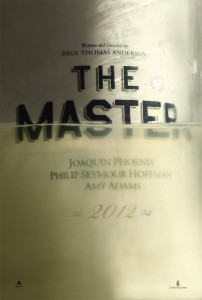
MPAA Rating: R
Director: P.T. Anderson
FilmPulse Score: 8/10
The Master is P.T. Anderson’s first film in five years since 2007’s Oscar-nominated There Will Be Blood. The most memorable aspect of There Will Be Blood was, arguably, Daniel Day-Lewis’s performance; the same can be said of Philip Seymour Hoffman and Joaquin Phoenix’s performances in The Master. Both should be hearing their names for an Academy Awards nomination – it would be a shame otherwise. There is more to The Master than Hoffman and Phoenix, but they are indubitably the catalysts behind P.T. Anderson’s film about, ultimately, human relationships.
First, we meet Freddie Quell, a Navy veteran who has a propensity to drink literally anything that contains alcohol, be it fuel, paint thinner, Lysol, film processing chemicals, or your garden variety liquor. Is Freddie likeable? Not really, but he is interesting, captivating even as Joaquin Phoenix portrays Freddie with an uneasy nervousness and unpredictability that keeps the viewer, much like Lancaster Dodd (Philip Seymour Hoffman), enthralled throughout the film.
Freddie meets Dodd, known to most as “Master,” on a boat, where Dodd and an array of family members and followers are gathered to celebrate his daughter’s wedding and, according to Dodd’s wife, Peggy (Amy Adams), to get away from civilization. Dodd is enigmatic and full of charisma – indeed, nearly everyone seems charmed by him. He, though, is immediately taken by Freddie, defending him even when others express concern regarding his alcoholism. Their relationship may appear unusual at first, yet each man has something the other needs: Dodd is a an apparently successful man who is a welcoming and accepting sort of father figure for Freddie, while Freddie, though not deeply involved with “the Cause,” is open and receptive to Dodd’s teachings and methods, while also providing a sort of challenge for Dodd, as he struggles to embrace a sober, responsible lifestyle and even, at times, Dodd’s eccentric practices.
At the same time, Freddie and Lancaster are similar characters, dealing with similar problems only in profoundly different ways. Freddie is running from his past while Lancaster is running from his critics and naysayers. Freddie chooses to deal with his past by drinking anything and everything. One realizes that Freddie doesn’t seem to take pleasure in his boozing, but rather uses his alcoholic concoctions to medicate himself and forget his painful memories. Lancaster knows this and, thus uses Freddie as a guinea-pig for his psychological experiments in an effort to cure him of his “savage” ways and, in turn, legitimize his own beliefs and findings, for if the results of his methods are verifiable, his critics will cease to affect him.
I think many viewers may find The Master to be one of Anderson’s most confounding and inaccessible films to date. The film’s themes, stories, and even character development seem almost vague and unreachable. In spite of this, the film remains deeply affecting. It is thoughtfully made, and, while some aspects may seem arbitrary, one gets the sense that each detail of the film was carefully designed to serve (albeit subtle at times) a valuable purpose. It is as though, in a way, Anderson is performing the same experiments on his viewers as Dodd is on Freddie – that is, pointing out small, seemingly irrelevant details that indeed do matter in the scheme of things. Like the memories that Freddie dredges up from his past, the film is, in some places, bewildering and meandering. There is little to guide the viewer toward a sense of time, apart from Peggy’s pregnancy, and it’s easy to get lost in the film as characters move from place to place, while very little happens on the surface. Similarly, the film itself mirrors the vagueness of Freddie’s past. While some memories are touched on (including a shocking snippet that is not pursued again in the film), few are developed, with the exception of his ambiguous relationship with Doris. After first viewing, film goers may feel that too little of the plot or characters has been fleshed out. However, I found this to be the appeal of Anderson’s film – that the very way in which he sculpted his film mirrored the aspects of its perplexing plot. Anderson has proven himself to be quite a master.







I must admit that I did not like this movie. I appreciated it, but didn’t like it. I left thinking “was that it?” Just read Roger Ebert’s review so I can save space; ’cause I think he nails it on the head. Phoenix and Hoffman are phenomenal, but Phoenix’s performance was at times too over-the-top for my taste. Then again, what P. T. Anderson movie doesn’t have an over-the-top performance? (Day-Lewis in THERE WILL BE BLOOD, Cruise in MAGNOLIA, pratically anyone in BOOGIE NIGHTS, etc.). At first I thought Adams was miscast as Hoffman’s wife, but I felt differently upon reflection. Like MAGNOLIA, this may be one I have to rewatch to appreciate.
Anderson explores a lot of complex human emotions in this film with such a deft, subtle touch that I feel it demands a rewatch. I could also be reading too much into it, but that is the fun of cinema. Everyone’s experience is different based on your own life experiences, philosophies and personalities. It was hard writing a review for this film because I think it warrants an essay to cover everything. I didn’t even say anything about Amy Adams really and I thought she was a very powerful character in the film playing Lancaster Dodd’s ‘Master’ almost.